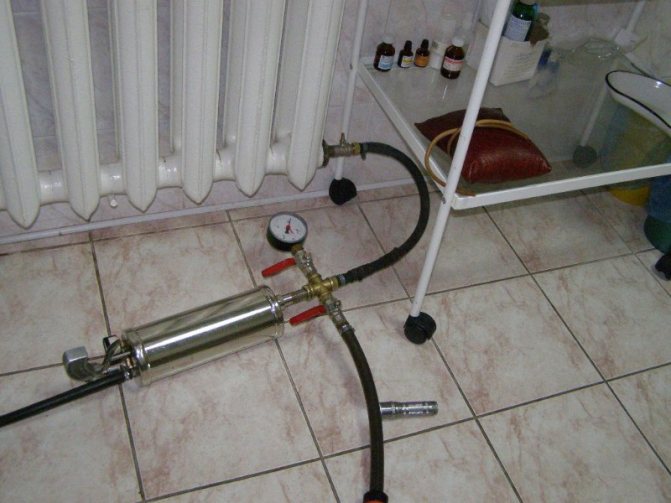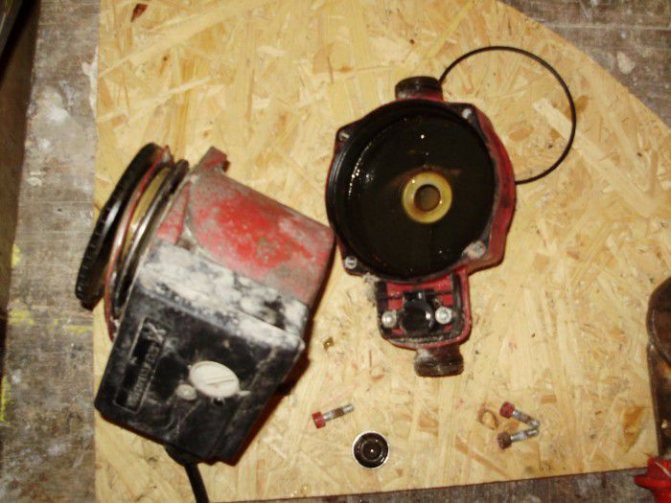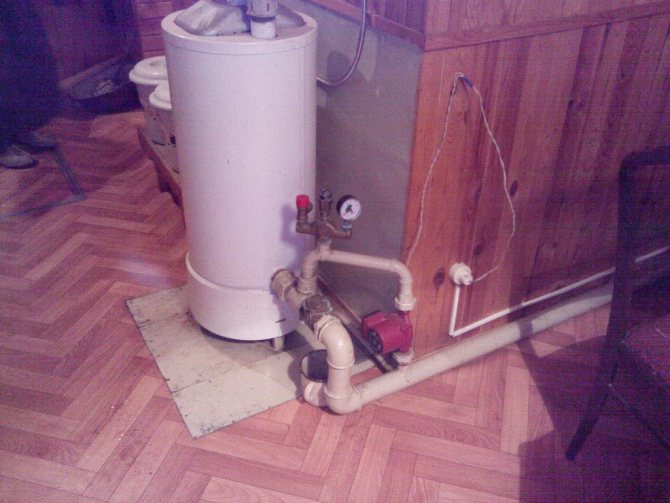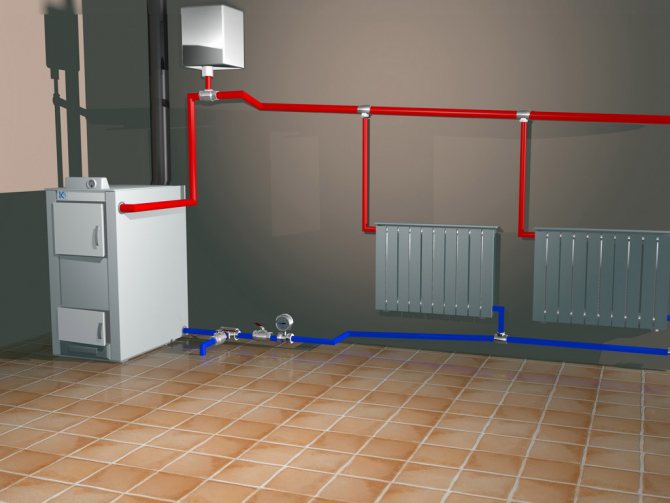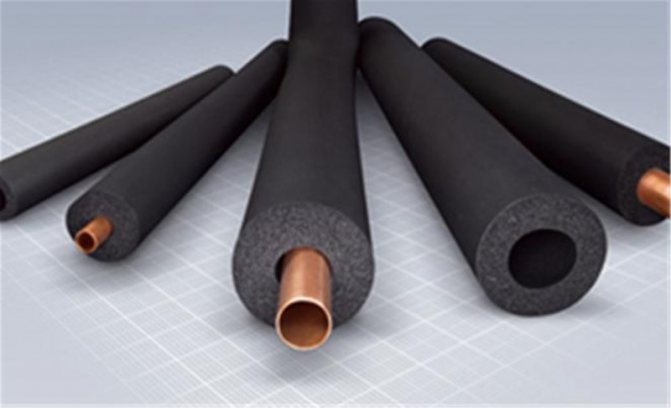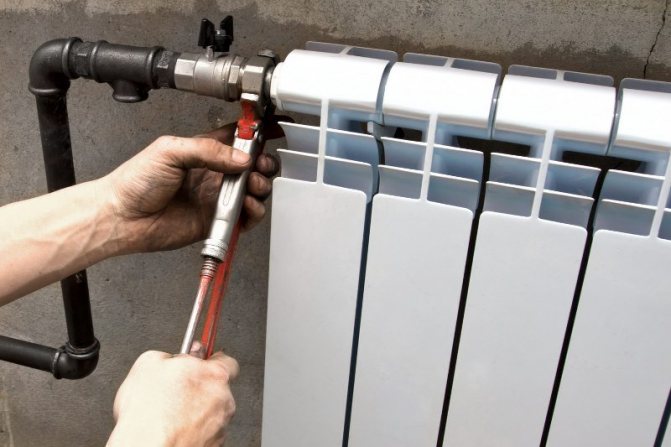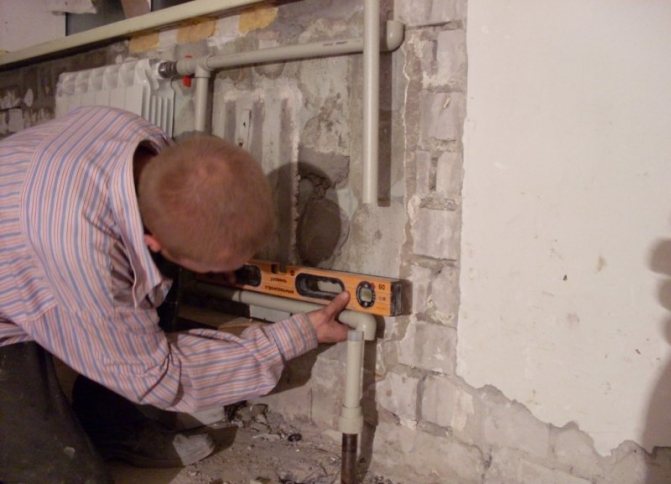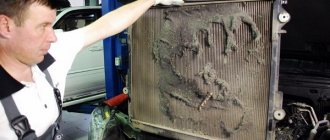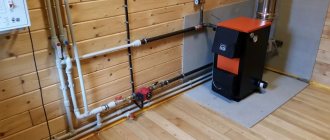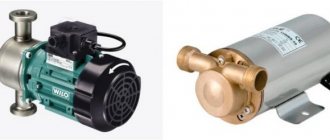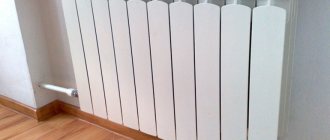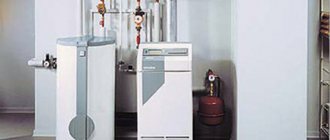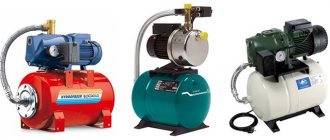Hiss and whistles
If the radiator hiss or whistles, this is a sign of a water leak. Moreover, the leak can be anywhere in the heating system. Sometimes water comes out in a heating pipe embedded in the wall, and the sound comes from a radiator 10 meters away from it.
If you live in a multi-storey building and have not found an obvious leak in your apartment, talk to your neighbors. Maybe somewhere in a secluded corner they already have a puddle. If an obvious place is not found, you should check:
- Parts of pipes embedded in ceilings and walls;
- Common riser;
- Places where the riser passes through the floors.
What flows most often?
Fistulas primarily appear along the welded seams of electrically welded pipes. This is understandable. In all likelihood, you will not bother with this problem and contact your home service organization for troubleshooting. Some leaks can be repaired by yourself. The stuffing box on the plug valve or on the valve is easy to tighten or fill by yourself. How to do this - there are many videos and other manuals that tell about the malfunctions of the corresponding taps and valves.
Threads are often leaking. Specifically, at the junction of the locknut with the clutch on the squeegee. There it is enough just to slightly tighten the locknut, or by closing the risers - your riser and the steam room, "give back" the locknut a little (unwind it along the thread), rewind the plumbing flax and re-tighten the locknut securely.
And another very common source of leakage is the plugs on the discharge. What is actually happening and why do the plugs start to leak? A locksmith, or one of the tenants, goes down to the basement to throw off his riser, to drain it. For example, for replacing radiators, and then going down to the basement, he simply forgets to take a reel with him - plumbing tape, fum tape or something else. And accordingly, this long-suffering plug is screwed on simply by the thread, tightening with effort. Steel - metal is not very ductile, and it is impossible to seal the connection in this way. The plug "whistles".
After some time, such fistulas are usually clogged, because the technical water in the heating system contains a lot of suspended matter and sludge. For some time, the plug will be a source of noise in the radiators and heating pipes. And it will naturally splash around, filling your basement with steam. Rewinding it is also easy. It is enough to shut off your riser together with the steam pipe to it, in the case of a bottom filling, or at the top filling, block one riser from the bottom and top in the attic, "give away" the plug, wind it up and screw it in again.
Murmur, rustle. Gurgling, the sound of pouring water in the battery
When such sounds appear, the reasons may be as follows:
- The appearance of an airlock;
- Littering of the heating system;
- Deteriorated gaskets.
Airing the heating system - the most common problem of the appearance of extraneous sounds in the system. Air can appear due to poor water or heat transfer fluid quality. This is especially true for aluminum radiators. Highly acidic and alkaline water reacts with the metal and produces a gas that creates a plug.
The second reason for the appearance of air is a poor-quality coolant. Over time, it can begin to break down and release oxygen or other gases (sometimes hazardous to health).
It is not difficult to find an airlock in the radiator. It is enough to touch it with your hand from above and below. If the battery is less hot in the upper part, air or gas has accumulated there.
If a Mayevsky tap is installed on the batteries, bleed the air from each individual radiator. Then wait 15-20 minutes and repeat the process. If there is no Mayevsky crane, the process will become more complicated. Read more about this in the article "How to properly bleed air from a heating battery with your own hands."
The batteries are buzzing
If there is air in the system, then this may be one of the reasons why the radiators are humming. In order to determine if there is airiness, it is necessary to check the quality of heating. In some sections, they may heat up unevenly or remain cold. This means that there is air. Therefore, the batteries begin to hum. To get rid of this, it is enough to release air from the system.
Air enters the radiator when:
- insufficient pressure in the heat supply sections;
- poor-quality installation;
- improper start of the heat supply device;
- an increased amount of air in the liquid;
- improper installation of individual parts of the system;
- debris;
- corrosion of the metal body of its elements;
- lack of air duct.
Clicks, knocks when heating and cooling
Sometimes extraneous sounds occur when batteries begin to heat up or cool down. This is due to the fact that they do it unevenly. The metal expands when heated and contracts when cooled.
In this case, you need to lay gaskets between the brackets on which the battery is attached to the wall or floor and the radiator itself. These can be ordinary pieces of rubber with a thickness of 2-3 mm.
Important!
If you have cheap bimetallic radiators, extraneous sounds may occur due to their internal structure. The design of bimetallic radiators differs from the rest - they use two metals. If they do not fit snugly together, you will hear clicks when expanding.
Noise in pipes with a working radiator
Understanding why heating batteries in a private or apartment building are cracking, it is important to consider the option when the reasons do not lie in the radiator. There are many places of occurrence of various types of hum and breakdowns of the heat supply that make pipes make noise, since it consists of:
- metal-plastic pipes;
- ball valve;
- direct-flow valve;
- membrane tank for heat supply;
- circulation pump;
- radiator;
- air vent;
- heating boiler;
- control valve.
Thus, there are several possible problems with a working radiator, which entail the appearance of noise.
- The point is the riser. Sometimes you can understand why the heating radiator is making noise by paying attention to the riser. After inspecting all the components of the heat supply sections, you will definitely find a wet leak, it must be eliminated immediately! You can do this yourself or with the help of your utility company.
- The water pump is to blame. The operation of the pump also helps to reject the reason why the radiator is making noise. If it buzzes, then: - it was installed poorly;
- - there is air in the heat supply sections;
- - the power does not correspond to the norm;
- - failure of the adjusting washers;
- - overheating;
- - wear and tear.
Heating system pressure testing.
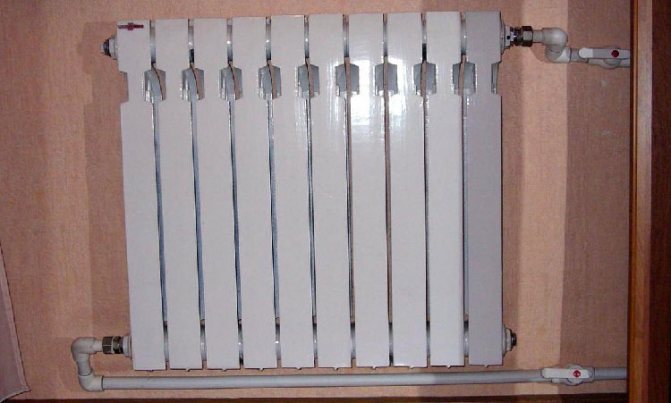
An extraneous hum in the pump itself may be a signal of its unstable operation. Voltage surges lead to desynchronization and uneven operation of the coolant. If the rotor or impeller - pump parts breaks down, all its components are disturbed, and this is also the cause of hum. The quality of pump functioning can be determined only after diagnostics with special equipment.
A hum in the heat supply device due to a malfunction of the circulation pump can occur due to installation and power discrepancy - the rotor should be located only horizontally.To determine the hum in the pump, it is necessary to disassemble the entire structure. Have the pump or its parts replaced by a professional.
- Check the boiler. After checking the radiators and the circulation pump, making sure they are working, you still hear an unpleasant noise. The heating boiler will help to understand this. If it does not function properly, the frequency of its switching on and off is set incorrectly and creates a crackle. The occurrence of a different type of hum in a heating boiler depends on the fuel used.
Heating boiler in a private house
- In solid fuel models, a crackling sound appears in the chimney. Due to its clogging and reduced air draft. To eliminate this problem, it is necessary to clean the chimney and turn on the heating boiler at full capacity.
Solid fuel boiler for home heating.
- In gas boilers, breakdown can be caused by different burner burning frequencies. In this case, the burner must be replaced.
- Diesel heating boilers emit a whistle that occurs from the nozzle due to an excess of soot that prevents heat transfer. To set it up, you need to install a thermostat.
Read more: Thermal calculation of the heating system rules for calculating the heat load
Having found out the reason indicating the boiler malfunction, you can easily understand why the pipes in your apartment or house began to knock. The reason is in the control valve. A ruptured control valve is a common consequence of noise in a heating installation. In this case, the liquid movement is blocked. The water pressure rises sharply and leads to rupture of the heating sections in the house. Repair of such a breakdown should only be carried out by specialists.
There is also such an option when the batteries and radiator in the apartment are in good order, but there is still noise during the operation of the system. Then it is worth looking for the reason in the basement, where the pipe entry points are located.
You can pay attention to:
- Possible leaks;
- Pump operation;
- The quality of the vibrating inserts.
The equipment must be replaced and repaired by a professional. But it is in your power to get a thorough inspection of the system for damage.
Noise, hum, hum, extraneous sounds
There are many reasons for constant noise in heating radiators. Let's break them down in order:
Wrong pipe diameter
Sometimes heating pipes are of different diameters and are connected with adapters. Because of this, a pressure drop occurs and turbulences appear in the water or coolant. They lead to vibration and extraneous sounds.
Often, a change in diameter occurs due to clogged pipes. Deposits can build up on their inner walls. This leads to a decrease in bandwidth.
The only way to solve the problem is to cut the old pipes and install new ones.
Pressure drops
Vibration can occur due to pressure surges in the heating system. The reason for this is the uneven operation of the circulation pump.
If you live in an apartment building, you can install a bypass. It will help compensate for pressure drops. But the best thing is to contact the utilities.
If you have your own heating system, diagnose and prevent the circulation pump. And best of all, call a specialist. This can be done using service for the selection of private specialists PROFI.RU.
Types of sounds and possible causes of their appearance
Extraneous sounds can occur anywhere in the heating system - in a riser or radiator, heat exchanger, circulation pump and other equipment located in technical rooms.
Since most modern houses have metal round pipes through which water circulates, according to the laws of physics, sound waves in a system can propagate quickly and over long distances. Often, the cause of the acoustic effect in the system can be located in the neighbors' apartment below or above the riser, and even in the basement / attic.
Pipes and radiators in a home can make various noises:
- hum - a sound reminiscent of the hum of a transformer or an airplane flying in the distance;
- knock - different in volume and frequency (it can be constant evenly tapping sounds or periodically arising sounds of beats);
- gurgling and gurgling of water.
Violations of the rules for operating the system by residents can also cause noise. For example, if the owners of one of the apartments put a working electrical appliance next to the riser, which contradicts the rules of operation, then the vibration from it can lead to an acoustic effect in the heating pipes.
We recommend that you read: How to install a chimney for a stove?
Causes of hum in pipes
Constant hum in pipes, reminiscent of the distant sound of an airplane flying or the hum of an electric transformer, usually occurs due to a disruption in the process of water flow. This may be a leak when a leak has arisen in one of the sections of the pipeline, from which a stream of hot water gushes.
The appearance of the sound effect in this case is explained by a simple law of physics, when an intense flow of particles through a relatively small hole causes an increase in pressure and the appearance of a specific sound. The sound wave is transmitted by metal pipes and water coolant and is well felt by the residents.
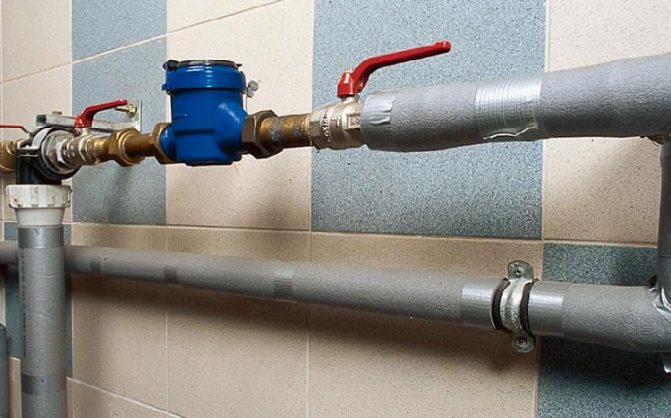

Another reason for the appearance of a hum is a narrowing of the lumen of the pipes in one of the sections of the system or a decrease in their patency. The pipes can be narrowed due to the formation of scale deposits, which occurs due to the increased concentration of salts of hardness of the water. When passing through a narrowed area, water creates the same acoustic effect as a leak. Sometimes the same phenomenon occurs when one of the neighbors in the riser changed the pipes for new ones, and their diameter turned out to be less than the standard ones.
Often, co-owners of apartment buildings hear a characteristic booming sound in pipes during the transition season, when utilities drain water from the system in preparation for winter or when water is put into the system and the start of hydraulic tests.
Why is there a knock on pipes?
Heating pipes can knock - constantly or periodically. This phenomenon is usually associated with:
- the presence of particles of debris, rust, scale in the riser or batteries;
- malfunction of shut-off valves;
- thermal expansion of metal reinforcement.
Debris particles are often the cause of knocking and grinding noise in heating systems, especially those that are old and worn out. There is usually a thick layer of limescale on the inner surface of old heating pipes.
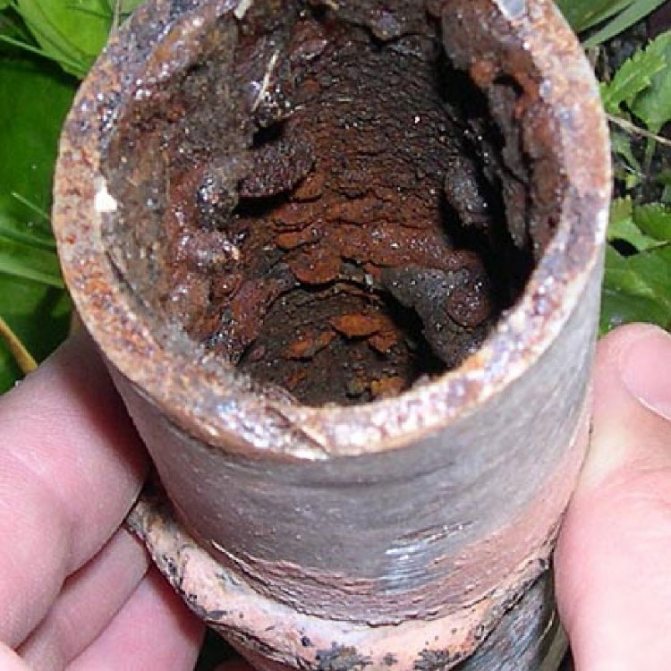

Under the influence of water pressure and high temperature, scale particles can break off and get stuck in one of the radiator sections or at the turn of the pipeline. With a constant flow of water, a piece of scale will hit the walls of the pipes, making a knock.
Attention! Rarely enough, faulty fittings, for example, a valve valve, become the cause of tapping in pipes. It can partially or completely come off and dangle in one of the sections of the system under the influence of a water jet.
The last known cause of pipe knocking is thermal expansion. We know from physics lessons that metal can expand and contract under the influence of temperature. As it heats up, its surface area becomes larger, which leads to an increase in the length of the pipeline by an average of 2 cm.
We recommend that you familiarize yourself with: How to make and install a heat exchanger (economizer) for a chimney with your own hands
During cooling, the reverse process occurs when the pipes are compressed to their original size. In this case, a knock occurs when there is an obstacle in the path of the pipe, or the pipe itself was installed unprofessionally (for example, it was fixedly attached to the wall at the turning section).
Temperature changes in pipes, as a result of which they constantly expand and contract, indicate a malfunction or unprofessional installation of the pipeline. Incorrect operation of the circulation pump, airing, pressure drop in the system lead to a decrease in heating efficiency when the coolant does not warm up all sections of the pipeline. In this case, you need to contact a specialist who will check the system as a whole.
Causes of water gurgling
A bubbling is an indication of the presence of air in the system. It can get there in various ways: through holes, cracks and holes in pipes or depressurization of coupling joints. Sometimes oxygen circulates in the system together with water, which is formed even with a closed sealed circuit as a result of the oxidation of ferrous iron. In this case, gas bubbles will gurgle.
Why do radiators in a private house make noise?
Having heard strange sounds from the battery, you can independently perform simple manipulations. First of all, check how the shut-off valve works by turning it several times from one extreme position to another and back. The obstructed rotation of the shut-off valves signals that it is not working properly. A good result is obtained by replacing the rubber gasket in the tap.
We offer you to familiarize yourself with Making an electric boiler with your own hands
Next, a thorough inspection of pipes and radiators is carried out. It is possible that a fragment with a lower temperature than neighboring areas will be found.
It makes sense to lay rubber inserts between the contacting pipes or the radiator and its mount. This will eliminate the cause of knocking and clicking.
If the noise does not stop, you should contact a specialist from the management company for help. You should not try to interfere with the operation of the entire heating system, this can harm yourself and your neighbors.
Batteries in a private home make noise for a variety of reasons. It is possible to fix a breakdown only after it is known exactly why the radiators are making noise.

